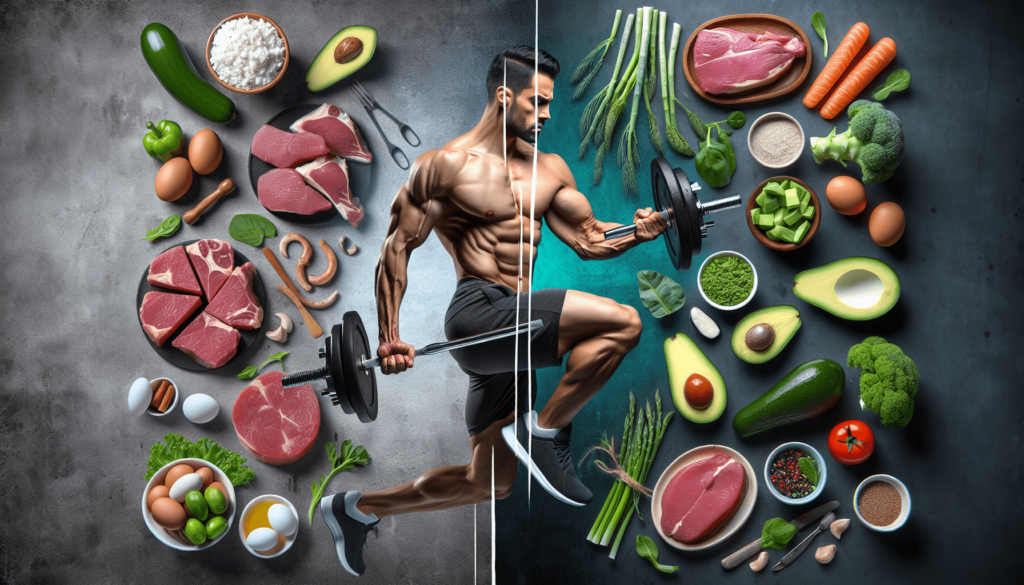Exploring the world of low-carb eating, “The Keto Athlete: Balancing Energy and Performance With Low-Carb Eating” opens up a treasure trove of knowledge for those who strive to meld an active lifestyle with the benefits of a ketogenic diet. Whether you’re new to the concept or looking to refine your approach, this article offers step-by-step guides and solutions to common challenges like the keto flu and balancing social life, making the shift toward a sustainable keto lifestyle seamless and enjoyable. It’s packed with practical advice, from meal prep to exercise, ensuring you have all the tools at your disposal to embrace a fulfilling, keto-adapted life with vigor. So, if you’re keen on unlocking the secrets to thriving as a keto athlete, you’ve found your gateway to a wealth of actionable insights tailored just for you.

Your Keto Journey Begins! Download the Recipes!
Understanding the Keto Diet for Athletes
Embarking on a ketogenic diet, especially as an athlete, is a path filled with potential and promise. It’s a journey that requires understanding, preparation, and an openness to change. As an athlete, you’re constantly in pursuit of performance gains, quicker recovery times, and better overall health. The ketogenic diet could be a strategy worth exploring to achieve these goals. Let’s dive in and unravel the ketogenic diet for athletes, examining its basics, benefits, challenges, and how to navigate them.
Basics of Ketogenic Diet: High-Fat, Moderate Protein, Low-Carb
At its core, the ketogenic diet emphasizes high-fat, moderate protein, and low-carbohydrate intake. This macronutrient composition pushes your body into a state of ketosis, where it burns fat for fuel instead of carbohydrates. Why does this matter for you, the athlete? Transitioning from carbs to fats as a primary energy source can significantly impact your endurance, recovery, and overall performance.
Transition to Ketosis: Encouraging the Body to Burn Fat for Fuel
Switching to a fat-burning engine doesn’t happen overnight. Your body requires time to adapt from using glucose (from carbohydrates) to using ketones (from fats) for energy. This transition period is crucial and needs patience and consistency. Keep your focus on the long-term benefits as you adjust to this new energy system.
Benefits of Keto for Athletic Performance
Many athletes who stick to the keto regimen report enhanced endurance, better body composition, and a more stable energy supply throughout their training and competitions. The rationale is simple: by relying on fat for energy, which is a more abundant resource even in the leanest athletes, you potentially unlock a more consistent energy source that doesn’t ebb and flow as carbohydrates do.
Potential Challenges and How to Overcome Them
Transitioning to keto can present hiccups like reduced initial performance, energy lulls, and nutrient deficiencies. However, these are typically short-lived and can be mitigated with strategic meal planning, electrolyte management, and patience. Remember, adaptation is key.
Starting a Keto Diet as an Athlete
Embarking on a ketogenic diet requires thoughtful planning and a commitment to adapting your eating habits to fuel your athletic pursuits effectively.
Assessing Nutritional Needs and Goals
Begin by evaluating your nutritional needs and how they align with your performance goals. Consider consulting with a nutritionist specialized in sports to tailor your diet to your body’s demands.
Creating a Balanced Keto Meal Plan for Athletes
Crafting a balanced keto meal plan involves including a variety of nutrient-dense foods to meet your fat, protein, and carbohydrate requirements. Focus on quality fats like avocados, olive oil, and nuts; adequate proteins from fish, poultry, and eggs; and minimal carbs from leafy greens and non-starchy vegetables.
Important Supplements and Nutrients for Keto Athletes
Supplements and key nutrients, including omega-3 fatty acids, magnesium, sodium, and potassium, are pivotal in addressing the increased need for electrolytes and supporting overall health and performance.
Common Mistakes to Avoid When Starting
A common pitfall is under-eating or skimping on fats. Ensure you’re consuming enough calories to support your activity level. Also, avoid neglecting hydration and electrolyte balance, which are vital for optimal performance and adaptation.
Optimizing Energy on a Low-Carb Diet
Maintaining high energy levels on a low-carb diet might seem daunting initially, but with the right strategies, it’s perfectly achievable.
Strategies for Maintaining Energy Levels
Frequent, small meals and snacks comprising fats and proteins can help maintain energy throughout the day. Listening to your body and adjusting your intake based on energy levels and performance is key.
The Role of Fats and MCTs in Sustained Energy
Fats, particularly Medium Chain Triglycerides (MCTs), play a crucial role in sustaining energy. MCTs are easily converted into ketones, providing a quick energy source that can support high-intensity workouts.
Pre and Post-Workout Nutrition
Tailoring your pre and post-workout nutrition is essential. Prioritize moderate protein and fat intake before training sessions and consider a small amount of carbohydrates post-workout to aid in recovery if you’re practicing a targeted ketogenic diet.
Monitoring and Adjusting Your Macro Intake for Performance
Fine-tuning your macronutrient intake based on performance feedback is crucial. Monitor changes in your training outcomes and be ready to adjust your dietary strategy to optimize results.
The Science of Keto Adaptation in Athletes
Keto adaptation in athletes is a fascinating process, bridging nutrition and physiology for optimal performance.
Understanding the Phases of Keto Adaptation
Keto adaptation occurs in phases, starting from the initial shift in fuel source to a more efficient fat-burning state. Expect variations in performance as your body undergoes these changes.
The Impact of Keto on Endurance and Strength
Research suggests that keto can benefit endurance by providing a steady energy source. Its impact on strength is still debated, but many athletes report maintained or even enhanced strength levels on keto.
Adaptation Period: What to Expect
The adaptation period can be challenging, with potential dips in energy and performance. Typically lasting a few weeks, this phase requires patience and commitment.
Long-term Effects of Keto Diet on Athletic Performance
Long-term, athletes on a ketogenic diet may experience sustained energy, improved body composition, and possibly a reduction in recovery times, contributing to better performance overall.

Tailoring the Keto Diet for Different Types of Athletes
No one-size-fits-all approach exists in diet or sport; the ketogenic diet is no different. Here’s how to tailor it to different athletic needs.
Considerations for Endurance Athletes vs. Strength Athletes
Endurance athletes might benefit greatly from the sustained energy from fat. Strength athletes, on the other hand, might need to adjust their protein intake and consider periodic carb refeeds to support muscle synthesis and recovery.
Carb Cycling and Targeted Ketogenic Diet for Performance
Carb cycling and targeted ketogenic diets offer flexibility for athletes requiring bursts of high-intensity performance, allowing for carbohydrate intake around workout times without exiting ketosis.
Keto for Weight-Class and Aesthetic Athletes
Athletes in weight-class sports or those focusing on aesthetics might find keto beneficial for maintaining muscle mass while reducing body fat, thanks to its protein sparing and fat loss properties.
Case Studies: Success Stories of Athletes on Keto
Many athletes across multiple disciplines report significant benefits from keto, including improved endurance, better weight management, and enhanced mental clarity during competitions.
Keto-Friendly Foods and Recipes for Athletes
Adopting a ketogenic diet doesn’t have to mean the end of delicious meals. Here’s how to keep your diet diverse and enjoyable.
Top Keto Foods for Optimal Nutrition and Energy
Focus on high-fat, low-carb foods like avocados, salmon, leafy greens, and high-quality meats. These provide the nutrients and energy needed for athletic performance.
Simple and Nutritious Keto Recipes for Athletes
There are countless keto recipes that are simple to prepare and packed with the nutrients athletes need. From smoothies and salads to hearty stews and casseroles, exploring keto recipes can keep your diet varied and satisfying.
Meal Prepping for the Keto Athlete
Meal prepping is your friend, ensuring you have ready-to-eat, keto-friendly meals that fit your nutritional needs, even on your busiest days.
Substituting Common High-Carb Foods
Finding keto alternatives for staple foods like pasta, rice, and bread allows you to enjoy your favorite meals without breaking ketosis. Creativity in the kitchen goes a long way!

Managing Keto Flu and Other Side Effects
Initiating a ketogenic diet can come with its set of challenges, commonly referred to as the “keto flu.” Here’s how to tackle them.
Identifying Symptoms of Keto Flu
Symptoms like fatigue, headaches, and irritability are common signs of the keto flu, signaling your body’s adjustment to ketosis.
Electrolytes and Hydration: Key Factors in Mitigating Side Effects
Staying hydrated and ensuring adequate electrolyte intake can significantly help reduce or even prevent keto flu symptoms.
Recovery Strategies and When to Consider Adjusting Your Diet
If symptoms persist, it might be worth revisiting your diet plan. Sometimes, a slight adjustment in macros or an increase in certain nutrients can alleviate issues.
Long-term Keto Side Effects and How to Manage Them
While many adapt well to a ketogenic lifestyle, some might experience long-term side effects like cholesterol changes or nutrient deficiencies. Regular health check-ups and tailored dietary adjustments can mitigate these.
Training and Performance Tracking on Keto
As you embark on a keto journey as an athlete, tracking your training and performance is crucial to gauge the diet’s impact on your athletic endeavors.
Establishing Effective Training Routines
Adjusting your training routine to align with your energy levels during the adaptation phase, then gradually increasing intensity, can help you maintain performance.
Leveraging Technology for Performance and Diet Tracking
Apps and devices designed to track dietary intake, workouts, and performance can be invaluable in adjusting your keto approach for optimal results.
Adjusting Workouts According to Energy Levels and Adaptation
Listen to your body. Some days you might need to scale back; on others, you might feel strong enough to push harder. Flexibility is key.
Benchmarking Performance Improvements
Regularly assessing your performance across various metrics can help identify the diet’s effectiveness and areas for adjustment.

Integrating Keto with Lifestyle: Social and Family Considerations
Maintaining a ketogenic lifestyle doesn’t have to be isolating. It’s possible to integrate this diet into your social and family life with some planning and communication.
Navigating Social Gatherings and Dining Out
Choosing keto-friendly options when dining out or explaining your dietary choices to hosts can help you stick to your regimen without missing out on social events.
Keto Meal Planning for Families
Involving your family in keto meal planning and preparation can make the diet more manageable and maybe even fun for everyone.
Balancing Keto with Social Drinking
Opting for low-carb alcoholic beverages and staying mindful of moderation can help you enjoy social drinking without derailing your diet.
Educating Friends and Family on Your Keto Lifestyle
Sharing the benefits and principles of keto with your loved ones can foster understanding and support, making your journey smoother.
Support and Community for Keto Athletes
Embarking on a keto journey as an athlete can feel daunting, but you’re not alone. Finding support and community can make all the difference.
Finding a Keto Coach or Nutritionist
A coach or nutritionist experienced in ketogenic diets for athletes can provide personalized guidance, helping you navigate challenges and optimize your diet.
Online Communities and Support Groups
Online forums and social media groups offer a wealth of knowledge, experiences, and encouragement from fellow keto athletes worldwide.
Keto-Focused Athletic Training Programs
Enrolling in training programs that cater to keto athletes can help you fine-tune your performance and nutritional strategies in a structured environment.
Events and Competitions for Keto Athletes
Participating in events and competitions aimed at keto athletes can be a great way to challenge yourself, meet like-minded individuals, and celebrate your achievements.
Embarking on the keto journey as an athlete is a decision that can potentially transform your performance, recovery, and overall health. By understanding the science, tailoring the diet to your athletic needs, and engaging with the keto community, you can navigate the challenges and reap the benefits of this powerful dietary strategy.



